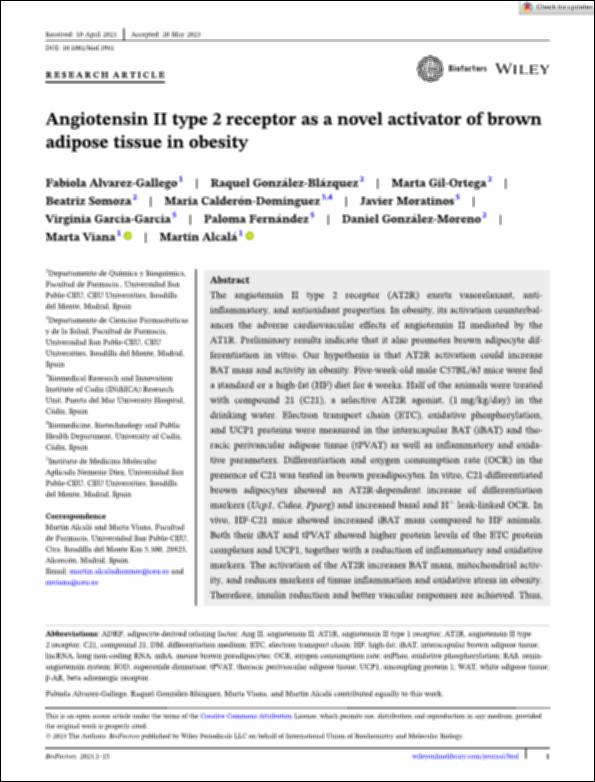Por favor, use este identificador para citar o enlazar este ítem:
http://hdl.handle.net/10637/14490Angiotensin II type 2 receptor as a novel activator of brown adipose tissue in obesity
| Título : | Angiotensin II type 2 receptor as a novel activator of brown adipose tissue in obesity |
| Autor : | Álvarez Gallego, Fabiola González Blázquez, Raquel Gil Ortega, Marta Somoza Hernández, Beatriz Calderón Domínguez, María Moratinos Delgado, Javier García García, Virginia Fernández Martínez, Paloma González Moreno, Daniel Viana Arribas, Marta Alcalá Díaz-Mor, Martín |
| Materias: | AT2R; Brown adipose tissue; Compound 21; Electron transport chain; Perivascular adipose tissue; UCP1 |
| Editorial : | Wiley |
| Citación : | Alvarez-Gallego F, Gonz alez-Bl azquez R, Gil-Ortega M, Somoza B, Calder on-Dominguez M, Moratinos J, et al. Angiotensin II type 2 receptor as a novel activator of brown adipose tissue in obesity. BioFactors. 2023. https://doi.org/10.1002/biof.1981 |
| Resumen : | The angiotensin II type 2 receptor (AT2R) exerts vasorelaxant, antiinflammatory, and antioxidant properties. In obesity, its activation counterbalances the adverse cardiovascular effects of angiotensin II mediated by the AT1R. Preliminary results indicate that it also promotes brown adipocyte differentiation in vitro. Our hypothesis is that AT2R activation could increase BAT mass and activity in obesity. Five-week-old male C57BL/6J mice were fed a standard or a high-fat (HF) diet for 6 weeks. Half of the animals were treated with compound 21 (C21), a selective AT2R agonist, (1 mg/kg/day) in the drinking water. Electron transport chain (ETC), oxidative phosphorylation, and UCP1 proteins were measured in the interscapular BAT (iBAT) and thoracic perivascular adipose tissue (tPVAT) as well as inflammatory and oxidative parameters. Differentiation and oxygen consumption rate (OCR) in the presence of C21 was tested in brown preadipocytes. In vitro, C21-differentiated brown adipocytes showed an AT2R-dependent increase of differentiation markers (Ucp1, Cidea, Pparg) and increased basal and H+ leak-linked OCR. In vivo, HF-C21 mice showed increased iBAT mass compared to HF animals. Both their iBAT and tPVAT showed higher protein levels of the ETC protein complexes and UCP1, together with a reduction of inflammatory and oxidative markers. The activation of the AT2R increases BAT mass, mitochondrial activity, and reduces markers of tissue inflammation and oxidative stress in obesity. Therefore, insulin reduction and better vascular responses are achieved. Thus, the activation of the protective arm of the renin–angiotensin system arises as a promising tool in the treatment of obesity. |
| URI : | http://hdl.handle.net/10637/14490 |
| Derechos: | http://creativecommons.org/licenses/by-nc-nd/4.0/deed.es openAccess |
| ISSN : | 1872-8081 (Electrónico) |
| Cubierto por: | Acuerdo Transformativo - 2023 |
| Fecha de publicación : | 7-jun-2023 |
| Centro : | Universidad San Pablo-CEU |
| Aparece en las colecciones: | Facultad de Farmacia |
Los ítems de DSpace están protegidos por copyright, con todos los derechos reservados, a menos que se indique lo contrario.


